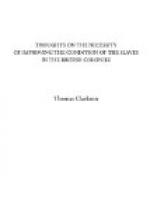Matters having been adjusted so far, Mr. Steele introduced the practice of rent and wages. He put an annual rent upon each tenement, which he valued at so many days’ labour. He set a rent also upon personal service, as due by the copyholder to his master in his former quality of slave, seeing that his master or predecessor had purchased a property in him, and this be valued in the same manner. He then added the two rents together, making so many days’ work altogether, and estimated them in the current money of the time. Having done this, he fixed a daily wages or pay to be received by the copyholders for the work which they were to do. They were to work 260 days in the year for him, and to have 48 besides Sundays for themselves. He reduced these days’ work also to current money. These wages he fixed at such a rate, that “they should be more than equivalent to the rent of their copyholds and the rent of their personal services when put together, in order to hold out to them an evident and profitable incentive to their industry.” It appears that the rent of the tenement, half an acre, was fixed at the rate of 9 l. currency, or between forty and fifty shillings sterling per acre, and the wages for a man belonging to the first gang at 7-1/2d. currency or 6d. sterling per day. As to the rent for the personal services, it is not mentioned.
With respect to labour and things connected with it, Mr. Steele entered the following among the local laws in the court-roll of the tenants and tenements. The copyholders were not to work for other masters without the leave of the lord. They were to work ten hours per day. If they worked over and above that time, they were to be paid for every hour a tenth part of their daily wages, and they were also to forfeit a tenth for every hour they were absent or deficient in the work of the day. All sorts of work, however, were to be reduced, as far as it could be done by observation and estimation, to equitable task-work. Hoes were to be furnished to the copyholders in the first instance; but they were to renew them, when worn out, at their own expense. The other tools were to be lent them, but to be returned to the storekeeper at night, or to be paid for in default of so doing. Mr. Steele was to continue the hospital and medical attendance at his own expense as before.
Mr. Steele, having now rent to receive and wages to pay, was obliged to settle a new mode of accounting between the plantation and the labourers. “He brought, therefore, all the minor crops of the plantation, such as corn, grain of all sorts, yams, eddoes, besides rum and molasses, into a regular cash account by weight and measure, which he charged to the copyhold-storekeeper at market prices of the current time, and the storekeeper paid them at the same prices to such of the copyholders as called for them in part of wages, in whose option it was to take either cash or goods, according to their earnings, to answer all their wants. Rice,




